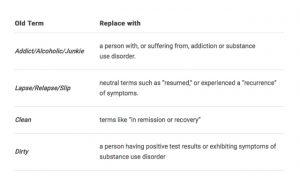With 23 million Americans recovering from addiction and 20 million still seeking treatment, Google decided to use its power to help out, resulting in its new Recovery Resource Hub
Only 10% of people who struggle with addiction receive treatment, according to the Addiction Center. Sometimes it can be difficult for those wanting help to find it, and many of them turn to Google for answers. Google reports it saw an all-time high last month for searches of “rehab near me,” “addiction treatment near me” and “how to help an addict.”
It makes sense when you look at the latest numbers on addiction we have from the U.S. Department of Health and Human Services. In 2017, nearly 20 million people struggled with substance abuse. Google’s locator tool can now help those seeking support find resources near them. Its “Recovery Resource Hub” makes it easy to type in a location and see different options for help in the area. The Hub points out many resources including counseling, housing help and recovery support. Recovery support meetings are mapped out with all the information you need to attend one of more than 83,000 meetings, plus the option to share it with others.
One important facet of the website aims to help people locate places to acquire Naloxone, the medication that can counter the effects of an opioid overdose. The Centers for Disease Control and Prevention reports that on average, 130 Americans die every day from an opioid overdose. Google’s locator tool searches for participating pharmacies nearby in case of someone overdosing on drugs such as heroin, morphine and oxycodone.
The U.S. Surgeon General put out an advisory saying Naloxone can be life-saving for “patients currently taking high doses of opioids as prescribed for pain, individuals misusing prescription opioids, individuals using illicit opioids such as heroin or fentanyl, health care practitioners, family and friends of people who have an opioid use disorder, and community members who come into contact with people at risk for opioid overdose.” The “Naloxone Locator Tool” includes more than 20,000 pharmacies in all 50 states including CVS, Rite Aid and Walgreens.
Another locator tool on Google’s “Recover Together” website helps people find places to dispose of their unneeded medications. Keeping medications around is a bad idea for many reasons, but most people still do it. A recent study by the National Institutes of Health found that only 32% of people dispose of unused opioid medication, while 63% of people admitted they kept the medication, and 5% reported they gave it to someone else or answered “other.” You don’t want young children getting their hands on it, and Google points out that accidental drug overdose is one of the most common sources of household injury. You also don’t want teens grabbing them to get high.
Google also mentions the main place teens acquire medicines to misuse is the medicine cabinet. You personally don’t want to take any drugs that are expired since they can be ineffective and possibly harmful. And finally, you don’t want these drugs contaminating our environment and water, which could happen if you flush them down the toilet.

Google’s Recovery Resource Hub includes examples of helpful and harmful terms for those seeking recovery.
Finally, the website discusses examples of how we can be thoughtful with our words when talking about addiction and recovery. It mentions that some terms can inadvertently pass judgement or reinforce stigma and suggests replacements.
With September being National Recovery Month, it’s a good time to take notice of what our relationship with prescription drugs looks like, as well as those around us who may need help. Addiction can be treatable if those struggling and the people around them have the right resources and know how to use them. Google’s features on its new “Recovery Resource Hub” are a step in the right direction for all involved.
